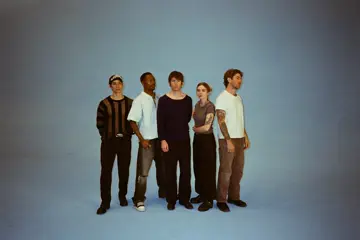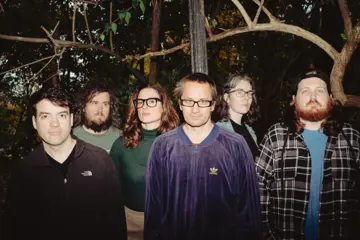Melbourne-based muso Darling James — in another life, James O'Brien of The Boat People — is a man blessed with a keen ear for a diversity of sounds, and the intelligence to use them, a fact that makes itself blindingly obvious on his excellent new EP, Theory Of Mind.
Proudly premiering with The Music today, Theory Of Mind marks the culmination of a couple years' work for Darling James, who first caught our attention with EP opener Ultimatum Talk last year, following it up with the hugely replayable The Itch earlier in 2016. Along with the previously released tracks, newer gems such as the jazzy discord of Ache & Bend and the eminently engaging Indonesian Cigarette provide further windows to O'Brien's broad musical nous.
Further helping that transparency is the fact that the lauded musician has been generous enough to take the time to pen his personal thoughts about all six of the EP's tracks, which you can read through below as you enjoy the release's sublime, frequently soulful sounds.
Said sounds have served the muso well over the past 18-or-so months, having steered him to pick up triple j and Double J rotation, undoubtedly aided by the touches of assistance from esteemed figures such as producers Robin Waters (Ella Hooper, Machine Translations) and John Castle (Dustin Tebbutt, GL), as well as a little songwriting nudge from Gotye himself, Mr Wally De Backer.
Don't miss a beat with our FREE daily newsletter
Theory Of Mind will be released tomorrow, 18 November; Darling James will mark the occasion when he steps out that evening in Brisbane, at the Brightside, with celebrated chanteuse Olympia.
For further details, see theGuide, or to keep tabs on Darling James as he unveils his future plans, give him a Like on Facebook.
Darling James — Theory Of Mind Track-by-track
By Darling James
'Theory of Mind' is the ability to ascribe contrasting mental states, ideas and experiences to different people and to understand others as independent entities from yourself. It allows us to explain and predict the actions of others. Most of us develop this skill or perspective as toddlers and understandably take it for granted.
This EP is about change, but more specifically it’s a snapshot of a kind of awakening or re-emerging. It’s about finding connection through the clarity of detachment and cultivating empathy with others through self-acceptance. I’ve borrowed the term ‘Theory of Mind’ to explain my own mini moment of intuitive cognitive development.
Ultimatum Talk
Ultimatum Talk was the first track from Theory Of Mind to be written and was far and away the fastest to come together. Long before the idea of Darling James even existed, Dan Parsons (Darling James drummer and successful singer-songwriter and multi-instrumentalist) asked me if I I’d like to record a demo at his house of any new songs I might have lying around. I had a phone voice memo of a simple hypnotic riff on ukulele and a fragment of melody. I couldn’t remember the tuning for the ukulele riff so I made up a new one and Dan and I quickly developed the arrangement.
The lyrics came together in around 15 minutes. I played acoustic guitar, piano, organ, marimba, mandolin and ukulele on this track which really set a precedent for Theory Of Mind featuring acoustic instruments despite the electronic style of some of the arrangements. Lyrically the theme of post-break-up resentment seems to have really connected with people. The story in the song is real and marked the beginning of a muddled and scary few years for me. The rest of the songs on Theory Of Mind explore the aftermath.
God’s Graffiti
Regret and redemption are hardly new topics for pop songs but I really liked the melody and central metaphor of God’s Graffiti when I came up with them. I had some misgivings about how this track might ‘fit’ but once I took it to the band we souped-up the arrangement and added in Zac Rush’s epic fuzzed-out guitar solo. In the end, I played and recorded everything on this myself except the drums (mixer John Castle sat in for this!) and Zac’s guitar. I also coaxed my girlfriend, Aneke, into the home studio late one night to sing the chorus a few times. She really didn’t want to but there’s something about the way someone sings who doesn’t think they’re a 'singer' that you can’t fake. It added a lot. More use of the marimba here too, which was actually a present from my mum.
Ache and Bend
The uneasy feeling of change and the subsequent lightness of rejuvenation — that’s what’s going on here. There’s an intensity to this song but also (I hope!) a lot of positivity. This is another track where I played almost everything. I really like shitty keyboards and started working on Ache & Bend not long after I picked up a Kawai home organ (think ‘your grandma’s Church’) from the tip shop for $30. It takes up as much space as a small desk but I ended up using it on almost every song on Theory Of Mind so it’s been worth it.
While working on this track with Robin Waters, we were at an impasse when I suggested asking saxophonist and guitarist Scott McConnachie (On Diamond) to come in and add some alto sax after the second chorus. Scott’s a wonderful musician and is in his element in the more ‘noise’ end of things, which I love. Robin knew that Scott lived a block away from the studio so it was meant to be!
The Itch
This song was the problem child of the bunch. When I came up with The Itch, I was pushing myself to write in different ways — to avoid old habits in my process and assumptions about how a song should come to life. I purposefully banned myself from thinking about the song from a technical point of view, even to the point of employing elements of chance such as randomly combining existing fragments of melody and harmony, or bass lines and chord voicings. It was a slow, slow process and I got myself in quite a mess (read: CRAZY). My manager suggested I send it to Wally De Backer (Gotye) to get a fresh perspective. Wally was really lovely and wrote detailed notes on what he thought could be improved or changed. That helped a lot.
With some distance now, I can say I really like the lyrics to this song. It alternates between snippets of ideas from physics and cosmology to much more worldly (!) concerns like parties, girls and anxiety. In the end, The Itch was saved by a great mix from John Castle who really separated the wheat from the chaff and also managed to make my shitty drumming sound almost good! Thanks to The Seed Fund for helping with this one too.
How Far Will You Go
Sometimes it’s good to write to a deadline. I was running an all-star variety night at the Melbourne Fringe Festival where a bunch of great songwriters were all premiering brand new songs and Darling James were the house band. I needed a new song too, so I wrote How Far Will You Go — part break-up song, part nostalgic self-examination. While I had a recorded version were I played everything, it ultimately benefited from being tracked with the band. Producer Robin Waters makes an appearance in the middle section on recorder too (as in, the annoying instrument you played in primary school!).
Indonesian Cigarette
This is the behemoth of the EP. The lyrics are all over the place, which is OK because I was pretty all over the place when I wrote them. It’s a series of blurry scenes and ideas linked mostly through a feeling of good-natured mania. Parts of it were written in hospital, which, looking back, makes total sense. Musically the song came from a simple guitar riff I came up with while at dinner at my friend Olivia’s place. I took this to the band and we built up the rest in the rehearsal room. Tom Baker (keys, voice and guitar in Darling James’ live band) worked really hard on this song, shaping the whole end section and working on the voices and keys in the chorus with me.
The cigarette in question was given to me by an Indonesian exchange student at a gig in Wollongong (of course) and although I no longer smoke I still love the smell of cloves they give off. Creating a sense of danger or uneasiness without being too dramatic was the aim in this song, and I think we got there.












